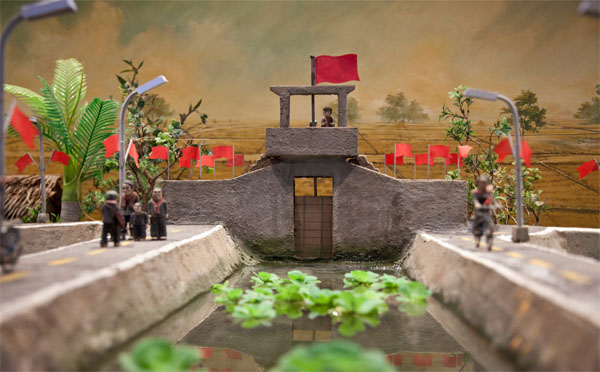“One of the essential titles in this year’s festival is The Missing Picture,” writes Manohla Dargis in the New York Times. “Directed by Rithy Panh, this haunting, at times shocking movie—part memoir, part indictment—fills the void suggested by its title: it creates an image of madness, specifically the Khmer Rouge’s rule over Cambodia in the 1970s. When he was a boy, Mr. Panh and his family were forced from their home in 1975, the year the Khmer Rouge seized control. Only he survived. With extraordinary grace, he tells his story and that of his ravaged country, using archival visual material, a heartbreakingly intimate narration… and small clay figures that, as they are whittled away, become stand-ins for the men, women and children subjected to incomprehensible horror.”
“Although The Missing Picture is meant to inform the audience of the horrific Khmer Rouge-controlled era as it charts Panh’s personal struggles, it doesn’t completely work as an informative lesson on the communist regime,” finds Nick McCarthy in Slant. “As a conceptual piece, the doc is a galvanizing account of a young boy’s war-torn realities, successfully elucidating on the corrosion of his soul, but as a history lesson it’s a little bleary-eyed.”
Panh “addressed his country’s brutal history several times before,” notes Mike D’Angelo in a dispatch to the Dissolve from Toronto, “in docs like S-21: The Khmer Rouge Killing Machine and Duch, Master of the Forges of Hell, but just as Art Spiegelman’s Maus (which depicts the Holocaust using mice for Jews and cats for Nazis) found a way of startling readers out of their historical-nightmare complacency, so, too, does The Missing Picture. Some things are so horrific that they perhaps need to be rendered inhuman.”
“The contrasting footage of Phnom Penh before and during the rule of the Khmer Rouge conveys what words can not describe,” writes Howard Feinstein at Filmmaker. “A once vibrant large city became totally deserted. The title points to Panh’s belief that available images do not reveal the awful truth, that those capable of doing so are ‘missing.’ Not to be forgotten is that the ascendancy of the Khmer Rouge followed the extensive bombing of the country by the U.S.”
Earlier: Reviews from Cannes, where The Missing Picture won the Prize of Un Certain Regard. The film was part of the Wavelengths program in Toronto and screens tonight and Tuesday, October 8, in New York.
Updates, 10/5: “Late in the film we see Panh examining rolls of damaged and decaying 16mm stock, presumably unearthed from Pol Pot’s propaganda archive and thus the source of The Missing Picture’s otherwise un-incriminating contextual footage,” writes Jordan Cronk in Reverse Shot. “All but stricken from the annals of visual transcript, the Kampuchean occupation of Phnom Penh continues to reside in the realm of reminiscence, in danger of being marginalized or, worse yet, altogether forgotten…. Panh’s memories, once strictly his own, are now the world’s to recollect and perhaps one day reconcile. Here is a man who has truly left his will on film.”
Gerard Raymond at the House Next Door: “Panh has made a powerful document of true horror, which he passes on to the audience as a way of exorcising the memory for himself: As the narrator says, ‘I wish to be rid of this picture so I show this to you.'”
“Unmissable,” declares Joshua Rothkopf in Time Out New York.
Updates, 10/13: For Richard Bernstein, writing for the New York Review of Books, “perhaps the greatest immediate value of Panh’s heroic efforts to preserve the memory of the Cambodian Holocaust is the implicit reminder that films like The Missing Picture provide of what is, in effect, a culture of oblivion and impunity in Cambodia today. The crimes were unspeakable, horrific, and well-known, and yet so far only one person, [Comrade] Duch, has been convicted of them—by the Special Cambodian-United Nations Tribunal that has been meeting in Phnom Penh now for almost four years. Many of the top KR leaders, including Pol Pot, are dead; only two other senior leaders remain on trial, and the government of the autocratic Prime Minister Hun Sen, which includes a number of people who were themselves close to the Khmer Rouge, has resisted expanding the trial to include other Khmer Rouge officials who were directly involved in orchestrating the killings.”
“Panh confers upon us as viewers the shared responsibility to carry forward the stories of those no longer with us, so that the memories of these genocidal crimes are never forgotten,” writes Christopher Bourne at Twitch. “With The Missing Picture, a brilliant work of emotional and historical archeology, Rithy Panh has given us an artistically ideal vehicle with which to achieve this worthy goal.”
NYFF 2013 Index. For news and tips throughout the day every day, follow @KeyframeDaily on Twitter and/or the RSS feed. Get Keyframe Daily in your inbox by signing in at fandor.com/daily.




